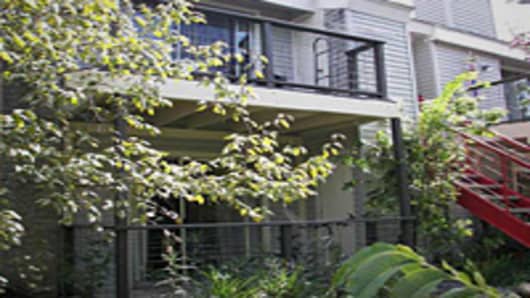Bargains are thinning out, but that hasn’t dampened the enthusiasm of real estate investors who target multi-family properties in the Sunbelt.
In what many see as a sign of recovery in the small-scale apartment market, rents are moving higher and cash flow is improving.
“Now is the best time [to own apartment properties] because the cash flow is a lot better,’’ says Kimbrough Gray, who owns multi-family properties in Austin, Texas.
More multi-family properties are becoming cash flow positive due to a combination of lower property values and mortgage costs (from continued low interest rates) and resilient rents.
Landlords Gaining Upper Hand
Rental income should only improve from here as the unemployment picture continues to improve and vacancy rates fall.
The national vacancy rate fell from 7.1 percent to 6.6 percent in the fourth quarter of 2010, according to commercial real estate researcher Reis.
Areas hardest hit in the housing collapse are starting to show signs of recovery. Phoenix and Orlando saw vacancies fall 2.6 percent over the last year while vacancies dropped 2.1 percent in Las Vegas, and 2 percent in Fort Lauderdale, Tampa, and Tucson.
Looking ahead, multi-family vacancy rates are forecast to decline from 5.8 percent in the current quarter to 4.9 percent in the first quarter of 2012, according to the National Association of Realtors.
Lower vacancy rates give landlords more leeway to raise rents and reduce concessions such as one-month-free rent specials. Indeed, effective rents are also improving, with 76 of the 82 apartment markets tracked by Reis posting year-over-year rent increases through the fourth quarter.
“The unprecedented breadth of this strengthening in apartment fundamentals, coupled with low-cost debt, will continue to fuel higher apartment investment activity,’’ says real estate investment services firm Marcus & Millichap in its 2011 market outlook.
Cash Flow is King
The collapse in property values, however, has spawned a shift in the approach of real estate investors from growth to income.
“No one is basing investments on equity appreciation like they were years ago,’’ says Joe Adkins, an investor and commercial broker in Altamonte Springs, Florida. “Five years ago an investor would take a negative cash flow because appreciation was so great. Now it's all about cash flow.”
Properties of four units or less, so called four-doors, have features that can be particularly attractive to investors.
Properties of this size can still qualify for long-term mortgages up to 30 years. Buildings of five units or more, meanwhile, must be financed through commercial loans that typically mature in seven years or less, forcing owners to refinance at prevailing interest rates that could lead to higher mortgage payments.
Jeffrey Sica, President of SICA Wealth Management in Morristown, N.J., says buying multi-family units now can be a good inflation hedge. He advises investors to lock in a long-term fixed-rate mortgage since this loan will be cheaper when interest ratesrise.
Multi-unit properties can be easier to manage and maintain than a portfolio of individual properties too. And they can also present a stronger case to banks for a loan as multiple tenants are considered a safer investment than a single tenant.
Bargains in the Sunbelt
Despite the recovery in rental conditions, depressed property values still present investment opportunities. Bargains still exist in Arizona, where property values remain depressed and vacancy rates remain elevated compared to national averages.
“Deals exist in Arizona right now,” says Mark Mozilo, a broker with Calcap Advisors in Pasadena, California. “Sales prices are at levels we saw in the 70s.”
In California, where vacancy rates have remained low and rents are strong, you’ll need to dig deeper into the REO (bank owned) and foreclosure markets.
“There is still substantial inventory available from lenders, receivers, and investment groups,” says Matthew Hars, managing director of New York real estate advisory Varick Capital. “There are also large quantities of non-performing notes available for sale available in California, which, if you can foreclose on the property, are a good bargain. You can even buy these for 50 cents on the dollar in some cases.”
You can also find deals in parts of Florida. Jacksonville is the weakest area in terms of vacancies and rent increases, while Orlando also shows promise.
Adkins points to a pair of duplexes for sale in Orlando for under $100,000 each that could bring in rents of $1,100 to $1,300 a month. That equates to a capitalization rate of over 13 percent, more than double the national average. (Cap rates are the full-year income from a property divided by its sale price.)
Brace for a Big Down Payment
Finding attractive properties is one thing. In today’s tight underwriting market, financing your sale can be more difficult. For distressed sales from a bank or foreclosureauction, veteran investors recommend paying cash.
If you can’t come up with a cash offer, you can improve your chances of getting a loan by putting as much money down as possible. An 80 percent loan-to-value mortgage (20 percent down payment) used to be the standard for four-unit properties, but today only borrowers with great credit can get such low down payments. Adjustable rate and subprime loans are also tougher to find.
In Texas, Gray says credit unions are offering more mortgages on multi-unit properties, filling in a void as traditional banks pare back on their exposure to real estate loans.
Investors also advise maintaining enough cash for initial improvements and several months of mortgage payments in case you have difficulty finding tenants.
“If you buy right and make sure you have enough working capital to see you through any speed bumps that might appear with the recovery,’’ says Dennis Fassett, who owns two apartment buildings in Michigan, “when things turn around anything you buy right now is going to be an incredible cash cow.”




